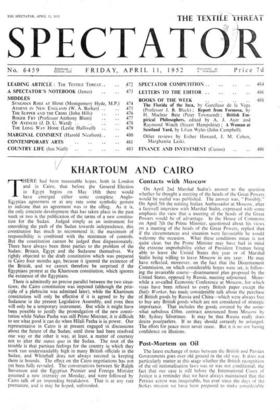KHARTOUM AND CAIRO
There is admittedly no precise parallel between the two situa- tions; the Cairo constitution was imposed (although the prin- ciple of a plebiscite was admitted later), while the Khartoum constitution will only be effective if it is agreed to by the Sudanese in the present Legislative Assembly, and even then will only be a temporary instrument. But while it might have been possible to justify the promulgation of the new consti- tution while Nahas Pasha was still Prime Minister, it is difficult to see what good it can do when Hilali Pasha is in power. Our representative in Cairo is at present engaged in discussions about the future of the Sudan; until these had been resolved one way or the other it was, at least, a matter of courtesy not to alter the status quo in the Sudan. The root of the trouble is that partisan feelings for the country in which they work run understandably high in many British officials in the Sudan, and Whitehall does not always succeed in keeping them in bounds. The effect on the Cairo negotiations has not yet been fully revealed. The conversations between Sir Ralph Stevenson and the Egyptian Premier and Foreign Minister assumed a new intensity on Monday, and were followed by Cairo talk of an impending breakdown. That is at any rate premature, and it may be hoped, unfounded.


































